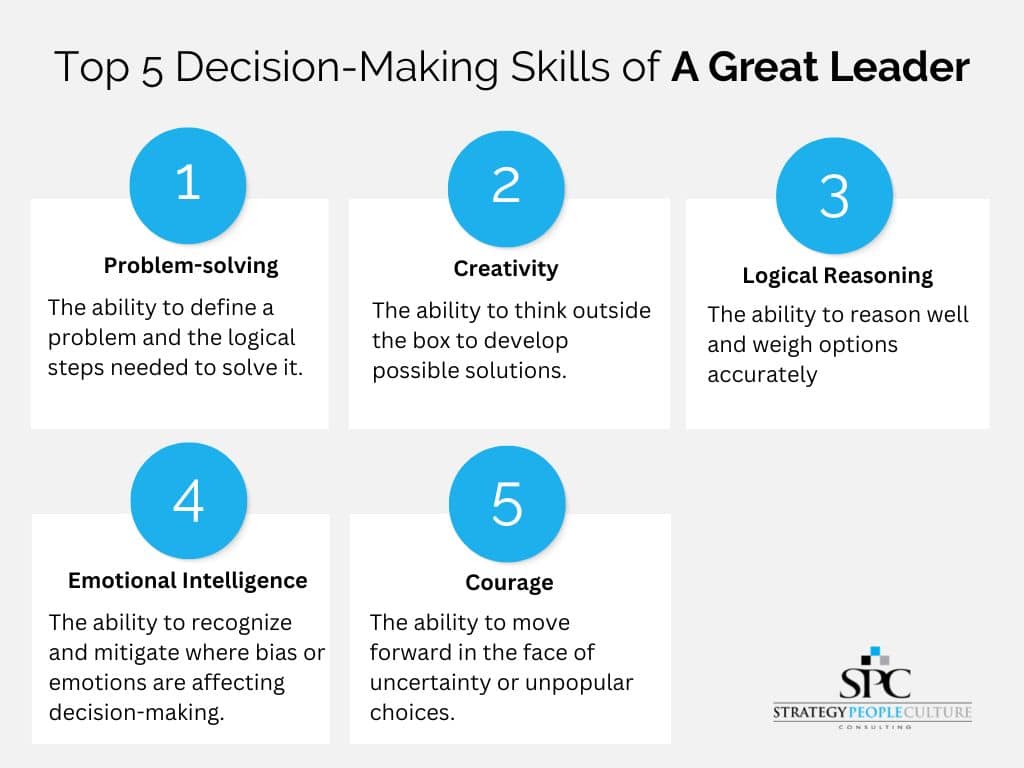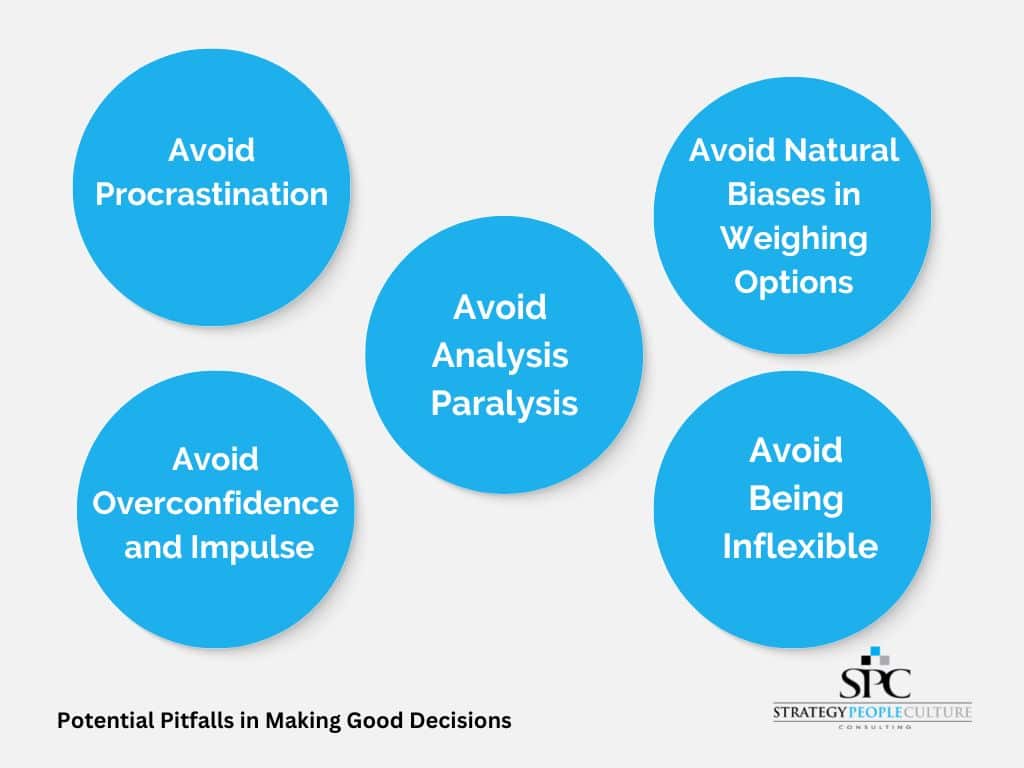Top 5 Decision-Making Skills of A Great Leader

Every day we are faced with decisions, big and small. Business leaders know this all too well, as the big ones generally fall on them. From deciding whether to pursue a new business venture or adding/laying off a personnel to any other choices that can make or break the success of an organization. Good decision-making skills are a must. But what exactly are good decision-making skills? And how do you know you’ve made a “good” decision?
The Makeup of a Good Decision-Maker

Simply put, a good decision-maker has the consistent ability to choose an option from many that ultimately addresses a problem or issue effectively. Or, they see beyond where there is only one apparent possibility. They make timely decisions and create positive outcomes. But why do some people seem to do this almost instinctively while others need to work at it? What qualities do good decision-makers have in common?
It’s probably no surprise that many of the qualities that make a great leader also lend themselves to good decision-making. But good decision-makers develop those qualities (in parentheses) into a specific skill set that gives them the ability to consistently choose wisely. These include:
- The ability to define a problem and the logical steps needed to solve it (Problem-solving)
- The ability to think outside the box to develop possible solutions (Creativity)
- The ability to reason well and weigh options accurately (Logical Reasoning)
- The ability to recognize and mitigate where bias or emotions are affecting decision-making (Emotional Intelligence)
- The ability to move forward in the face of uncertainty or unpopular choices (Courage)
Let’s look at each in a little more detail.
1. Problem-Solving: The Ability to Define a Problem and the Logical Steps Needed to Solve It

To solve a problem, it is absolutely critical to understand clearly what needs to be resolved. It is also important to understand the factors or resources available that will affect the resolution and path forward. Good decision-makers are good problem-solvers. They take time with this step to fully frame the problem and all incremental milestones that lead to a solution. This includes understanding any obstacles or constraints (such as financial resources or stakeholder opinions) that affect possible outcomes.
2. Creativity: The Ability to Think Outside the Box to Develop Possible Solutions

Once a clear picture of the problem is in view, good decision-makers brainstorm a list of options and possibilities without judgment or prejudice. They know how to form the right team to help with this process and tap into their own ability to influence to get the team’s full commitment. That is, they tap into their creativity.
In this Harvard Business Review article, the authors suggest framing the question of possible solutions with “what could I do?” rather than “what should I do?” This encourages thinking beyond obvious or given options and fosters more insight and creative thinking. Good decision-makers naturally do this – they look at solutions in terms of what is possible.
3. Logical Reasoning: The Ability to Reason Well and Weigh Options Accurately

Good decision-makers never weigh a list of options without asking hard questions and gathering information. They rely on their logical reasoning ability. This involves taking time to fully evaluate hard data for the right metrics and to interpret the right conclusions from them.
Ultimately a good decision-maker collects all these inputs and can clearly describe the expected outcomes and consequences of their chosen option. They may not always be right, but they often are. And when they misstep, they accept responsibility, and they course-correct or learn for future courses of action.
4. Emotional Intelligence: The Ability to Recognize and Mitigate Where Bias or Emotion Is Affecting Decision-Making

Tapping into emotional intelligence is what often sets good decision-makers apart. This is because decision-making can be full of pressures that introduce myriad emotions or conjure multiple forms of bias in one’s mind. For example, decisions with broad-long-term effects may stir up fears of failure that may guide us to a safer approach than is needed. Time-frame pressures or others’ scrutiny may lead us to look for a more immediate outcome rather than a solution that has a longer-term impact. (Congressional decisions often are an example of this.) Or commitment of time and resources to a particular solution may prevent us from course-correcting when its need becomes apparent. Effective decision-making requires the ability to recognize and mitigate these pressures’ influence and focus solely on facts.
5. Courage: The Ability to Move Forward in the Face of Uncertainty or Unpopular Choices

Without question, good decision-making takes courage. Despite our best efforts to frame a problem, creatively research, and logically weigh the effectiveness of possible solutions, we are often still left with uncertainty. This is the nature of the beast. Many problems to be solved are new and exact solutions have never been tried before.
Another trait of leaders who consistently make good decisions is having the courage to know when a popular choice is not necessarily the best one. They balance all stakeholders’ needs to feel heard with their own needs to influence the team to buy into a better option. At times this leads to unpopular but necessary decisions around a variety of issues, from employment-related matters to risk management to customer improvement, etc.
Good decision-makers understand how to balance their methodical approach and reasoning with intuition and past experience to move forward confidently in a timely manner. They don’t exhaustively analyze or are led astray by “group think.” They follow through with clear metrics for success, and they possess the flexibility to course correct if needed to achieve this intended outcome. Finally, they hold themselves accountable.
Potential Pitfalls in Making Good Decisions

Even the best decision-makers can sometimes encounter pitfalls. We are all human, and inevitably we, at times, get in our own way. Here are some common pitfalls to avoid to maintain your decision-making effectiveness.
1. Avoid Procrastination
We all do it. When we encounter new problems with little experience to guide us or possibly find ourselves needing to make a difficult choice with an unpleasant outcome, we procrastinate. Instead, experts recommend tackling stressful decisions first.
2. Avoid Overconfidence and Impulse
According to Francesca Gino of Harvard Business School, the more expertise you have, the more likely you are to ignore “bad news” in your decision-making process. (One of the most notorious examples of this was NASA’s Challenger launch decision.) Alternatively, she says, experts can also be overconfident in their ability to overcome these obstacles. This leads to impulsive decision-making. One way to overcome this is to rely on your team and have people play devil’s advocate for you when weighing options.
3. Avoid Analysis Paralysis
Analysis paralysis stems from perfectionism. Fear of making the wrong decision causes us to overthink every option. This can lead to burnout or abandoning any course of action at all. This is where tapping into our courage can help. We don’t always have all the information we need. But some action, with the flexibility to course correct, is better than none. And keeping tabs on our success metrics along the way can help guide that course correction.
4. Avoid Natural Biases in Weighing Options
At times, when weighing various solutions to the problem we are trying to solve, we will only look at evidence that supports our narrative. This is similar to the problem of overconfidence. Dr. Gino recommends weighing options side by side rather than one by one in sequence to help mitigate the effects of one’s natural bias. This allows us to compare all the options to each other rather than evaluating each one individually. When you evaluate options individually, it is harder to avoid measuring them against our values rather than objectively against other options.
5. Avoid Being Inflexible
Rather than course-correcting, we tend to stay committed to a less optimal solution unnecessarily. Often this happens because we have invested resources in a course of action, or possibly team consensus has led us down that path. This can be avoided by planning for change along the way with interim checkpoints and solid evidence that motivates the change.
Why Good-Decision-Making Matters in Leadership

There is not a single leader on the plane who makes the best decision (with hindsight as an advantage) 100% of the time. That said, good decision-making is one of the hallmarks of a good leader, ultimately impacting company performance. Decisiveness gives people confidence in your leadership and makes them want to follow you. That is, it helps create the influence. It provides clear direction, minimizing errors. Ultimately, when its leadership makes quick, sound decisions, a business runs more smoothly and achieves its goals on time.
This is why it is so important to avoid the pitfalls mentioned in the last section. If you believe an objective thought and challenge partner could be beneficial to the further development of this skill, executive and leadership coaching may help. Strategy People Culture has the expertise to help you tap into your strengths to develop the skills we’ve discussed. Please do not hesitate to reach out to us. Strategy People Culture is about “Fostering better awareness for people and business!” Call us at (833) ROCK – SPC or (833-762-5772) or email us at info@strategypeopleculture.com for more information.
